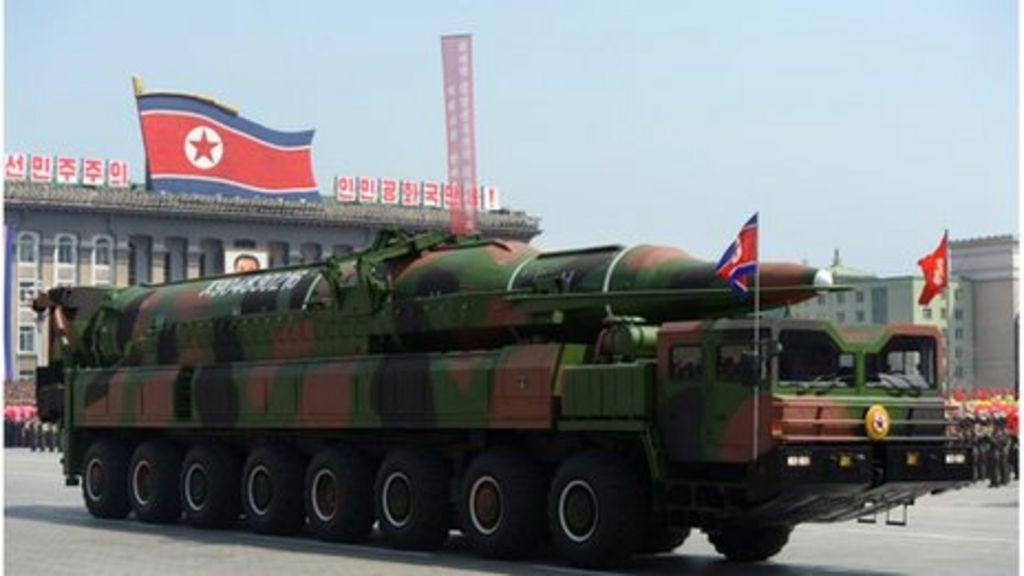By MATTHEW BROWN

Chinese vehicles were seen towing ballistic missiles during a North Korea military parade
China defended its trade practices on Tuesday after Chinese vehicles were seen towing ballistic missiles during a North Korea military parade despite international sanctions against selling military hardware to Pyongyang.
Saturday's parade honoring North Korea's country's founder, Kim Il Sung, came amid heightened tensions over the country's nuclear ambitions.
Saturday's parade honoring North Korea's country's founder, Kim Il Sung, came amid heightened tensions over the country's nuclear ambitions.
It featured a senior official, Choe Ryong Hae, warning of "all-out war" if North Korea is attacked.
Photos provided by the North Korean government showed the submarine-launched missiles being pulled by trucks bearing the logo of the Chinese company Sinotruk.
Chinese Foreign Ministry spokesman Lu Kang said China conducts "normal" business with its neighbor North Korea while adhering to sanctions imposed beginning in 2006 by the U.N. Security Council.
China accounts for an estimated 80 percent of North Korea's foreign trade, along with crucial food and fuel assistance.
A sales manager for a Sinotruck dealer, Zhongnanhai, said the company exports about 1,000 trucks to North Korea every year under contracts that specify the vehicles are designed and manufactured for civilian use.
Zhongnanhai sells the trucks to a dealer in the border city of Dandong before they are resold to North Korea, he said.
"We fully comply with the government regulations. If they are used by North Korea for military purpose, they must have been modified by the North Korean side," said the sales manager, who would give only his surname, Wang.
He added that his company has "no way to monitor and approve the use of the trucks by North Korea."
International observers have warned that over the past decade North Korea has become adept at circumventing the U.N. sanctions, particularly so-called dual-use equipment that has both military and civilian applications.
North Korea makes use of "weak transshipment regulations, falsified cargo declarations and shipping documents, reflagging and disguised materials to import banned materials," according to a 2015 report for the European Union Institute for Security Studies.
Photos provided by the North Korean government showed the submarine-launched missiles being pulled by trucks bearing the logo of the Chinese company Sinotruk.
Chinese Foreign Ministry spokesman Lu Kang said China conducts "normal" business with its neighbor North Korea while adhering to sanctions imposed beginning in 2006 by the U.N. Security Council.
China accounts for an estimated 80 percent of North Korea's foreign trade, along with crucial food and fuel assistance.
A sales manager for a Sinotruck dealer, Zhongnanhai, said the company exports about 1,000 trucks to North Korea every year under contracts that specify the vehicles are designed and manufactured for civilian use.
Zhongnanhai sells the trucks to a dealer in the border city of Dandong before they are resold to North Korea, he said.
"We fully comply with the government regulations. If they are used by North Korea for military purpose, they must have been modified by the North Korean side," said the sales manager, who would give only his surname, Wang.
He added that his company has "no way to monitor and approve the use of the trucks by North Korea."
International observers have warned that over the past decade North Korea has become adept at circumventing the U.N. sanctions, particularly so-called dual-use equipment that has both military and civilian applications.
North Korea makes use of "weak transshipment regulations, falsified cargo declarations and shipping documents, reflagging and disguised materials to import banned materials," according to a 2015 report for the European Union Institute for Security Studies.
Aucun commentaire:
Enregistrer un commentaire